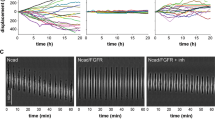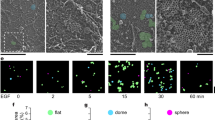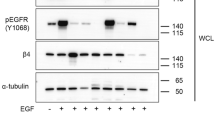Abstract
Although Src expression and activity are often elevated in colon cancer1,2,3, the precise consequences of overexpression of the non-catalytic Src homology (SH) domains, or enhanced catalytic activity, are unknown. We show that, in KM12C colon cancer cells, elevated Src activity causes the components of adherens junctions, including vinculin, to be redistributed to Src-induced integrin–adhesion complexes. Specifically, elevated Src activity blocks proper assembly of cell–cell contacts after cells are switched from media containing a low level of calcium to media containing a high level of calcium, and E-cadherin remains internalized. In contrast, although elevated expression of the non-catalytic domains of Src is sufficient to induce assembly of integrin–adhesion complexes, it does not induce disorganization of E-cadherin-associated intercellular contacts. Surprisingly, Src-induced disruption of E-cadherin localization requires specific integrin signalling, because E-cadherin redistribution is blocked by loss of cell-matrix interaction, or by inhibitory antibodies to αv or β1 integrin subunits. Furthermore, phosphorylation of the integrin-regulated focal adhesion kinase (FAK) on Src-specific sites is required for Src-induced de-regulation of E-cadherin, demonstrating interdependence between integrin-induced signals and cadherin-associated adhesion changes induced by Src.
This is a preview of subscription content, access via your institution
Access options
Subscribe to this journal
Receive 12 print issues and online access
$209.00 per year
only $17.42 per issue
Buy this article
- Purchase on Springer Link
- Instant access to full article PDF
Prices may be subject to local taxes which are calculated during checkout




Similar content being viewed by others
References
Talamonti, M. S., Roh, M. S., Curley, S. A. & Gallick, G. E. J. Clin. Invest. 91, 53–60 (1993).
Biscardi, J. S., Tice, D. A. & Parsons, S. J. Adv. Cancer Res. 76, 61–119 (1999).
Cartwright, C. A., Coad, C. A. & Egbert, B. M. J. J. Clin. Invest. 93, 509–515 (1994).
Irby, R. B. et al. Nature Genet. 21, 187–190 (1999).
Abram, C. L. & Courtneidge, S. A. Exp. Cell Res. 254, 1–13 (2000).
Kaplan, K. B., Swedlow, J. R., Morgan, D. O. & Varmus, H. E. Genes Dev. 9, 1505–1517 (1995).
Felsenfeld, D. P., Schwartzberg, P. L., Venegas, A., Tse, R. & Sheetz, M. P. Nature Cell Biol. 1, 200–206 (1999).
Owens, D. W. et al. Mol. Biol. Cell 11, 51–64 (2000).
Calautti, E. et al. J. Cell Biol. 156, 137–148 (2002).
Fincham, V. J., Brunton, V. G. & Frame, M. C. Mol. Cell Biol. 20,6518–6536 (2000).
Fincham, V. J. & Frame, M. C. EMBO J. 17, 81–92 (1998).
Klinghoffer, R. A., Sachsenmaier, C., Cooper, J. A. & Soriano, P. EMBO J. 18, 2459–2471 (1999).
Morikawa, K., Walker, S., Jessup, J. M. & Fidler, I. J. Cancer Res. 48, 1943–1948 (1988).
Mao, W. et al. Oncogene 15, 3083–3090 (1997).
Lewis, J. M. & Schwartz, M. A. Mol. Biol. Cell 6, 151–160 (1995).
Calalb, M. B., Polte, T. R. & Hanks, S. K. Mol. Cell. Biol. 15, 954–963 (1995).
Schlaepfer, D. D. & Hunter, T. Mol. Cell. Biol. 16, 5623–5633 (1996).
Warren, S. L. & Nelson, W. J. Mol. Cell. Biol. 7, 1326–1337 (1987).
Behrens, J. et al. J. Cell. Biol. 120, 757–766 (1993).
Hamaguchi, M. et al. EMBO J. 12, 307–314 (1993).
Boyer, B., Roche, S., Denoyelle, M. & Thiery, J. P. EMBO J. 16, 5904–5913 (1997).
Fujita, Y. et al. Nature Cell Biol. 4, 222–231 (2002).
Morgenstern, J. P. & Land, H. Nucleic Acids Res. 18, 3587–3596 (1990).
McLean, G. W., Fincham, V. J. & Frame, M. C. J. Biol. Chem. 275, 23333–23339 (2000).
Acknowledgements
We thank J. Wyke and V. Fincham for help and comments, and P. McHardy and T. McGuire for help with figures. We are also grateful to I. Fidler for KM12C cells, P. Schwartzberg for CA10-Src251–GFP, T. Hunter and N. Carter for anti-Src N2-17 ascites fluid, D. Sheppard and J. Marshall for the antibodies to various integrin subunits. This work was funded by Cancer Research UK.
Author information
Authors and Affiliations
Corresponding author
Ethics declarations
Competing interests
The authors declare no competing financial interests.
Rights and permissions
About this article
Cite this article
Avizienyte, E., Wyke, A., Jones, R. et al. Src-induced de-regulation of E-cadherin in colon cancer cells requires integrin signalling. Nat Cell Biol 4, 632–638 (2002). https://doi.org/10.1038/ncb829
Received:
Revised:
Accepted:
Published:
Issue Date:
DOI: https://doi.org/10.1038/ncb829
This article is cited by
-
Focal adhesion kinase: from biological functions to therapeutic strategies
Experimental Hematology & Oncology (2023)
-
Anti-progranulin/GP88 antibody AG01 inhibits triple negative breast cancer cell proliferation and migration
Breast Cancer Research and Treatment (2021)
-
RETRACTED ARTICLE: Shp2 positively regulates cigarette smoke-induced epithelial mesenchymal transition by mediating MMP-9 production
Respiratory Research (2020)
-
Paracrine SPARC signaling dysregulates alveolar epithelial barrier integrity and function in lung fibrosis
Cell Death Discovery (2020)
-
EPS8 phosphorylation by Src modulates its oncogenic functions
British Journal of Cancer (2020)



